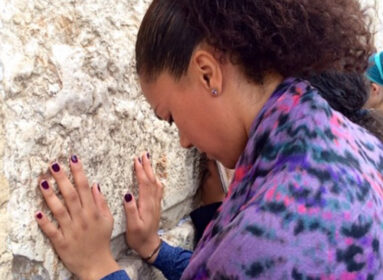 This week we asked Connecticut’s rabbis to offer their approach to the issue of gun control from a Jewish point of view. Here is what they had to say.
This week we asked Connecticut’s rabbis to offer their approach to the issue of gun control from a Jewish point of view. Here is what they had to say.
 Rabbi James Prosnit
Rabbi James Prosnit
Congregation B’nai Israel
Bridgeport
Board member/ Past President, Connecticut Against Gun Violence
There are many Jewish texts we could trot out that speak to the need for gun regulations. “Swords into plowshares,” “Standing idly by while our neighbor bleeds…” But these days I think the most important message is the commandment against idolatry.
Gun worship is pervasive in our land and the challenge is to change that culture? Other countries have deranged and disaffected folks who become unhinged; but only in America does the proliferation of guns enable that to translate to mass killings. The Supreme Court says the Second Amendment allows individual gun ownership. But regulating that right is okay too. Three hundred million guns are out there in this country and the gun lobby wants us to buy more, that are bigger and more lethal.
Guns in a home are overwhelmingly more likely to be used to hurt someone in the home (or community) than an intruder.
I write on the sheloshim [the 30th day] of the tragedy in Newtown. It is in our power to change the conversation. It is in our power to try to protect our children.
It is in our power to honor the memory of these children and their teachers
 Rabbi James Rosen
Rabbi James Rosen
Beth El Temple
West Hartford
I grew up in the state that treasured “the great outdoors” and was proud of the hunting tradition. Virtually everyone I went to school with was part of a hunting family.
At the same time, I don’t recall great zeal for guns themselves. In fact, most of the hunting dads used to speak endlessly about the need for education and safety. In addition, when handgun violence began to grow, they were amongst the first to decry it and call for greater regulation and background checks.
These days even after Newtown, the lines seem to be drawn hard and fast: Second Amendment rights vs. greater regulation. We are told that “the real problem” is in the delivery of mental health services, and overly violent culture, the absence of the ethics , and of personal responsibility.
As an observant Jew and a horrified citizen, I must ask simply “why can’t it be all of the above?” We are facing a public safety nightmare. We live in a culture that glorifies violence. There is a lack of proper mental health services. Our schools and cities are violence ridden on multiple levels. Too many people lack the sense of constraint in addressing personal conflicts.
Because we cannot do everything we shall do what we can. In Jewish tradition, the saving of life comes first. Public safety matters above all. Children have the right to go to school feeling safe and with confidence. The tradition speaks the language of responsibility far more than rights. A roof needs a parapet, and a culture needs limits on its most dangerous implements.
We carefully regulate drugs and countless everyday objects. A car requires a license to drive, and new hires undergo criminal and background checks.
Can we not at least agree that easy availability of highly destructive weapons should be curtailed? Can we not at least agree to have significant background checks to be sure that weapons do not fall into the wrong hands. To uphold public safety where is the beginning point?
 Rabbi Jeff Glickman
Rabbi Jeff Glickman
Temple Beth Hillel
South Windsor
The Jewish faith has some core values.
One of them is moving from fear to faith.
Fear means not knowing what will happen next, and thinking that something will get broken, lost or hurt. That tomorrow will be worse than today. The response to fear is to do something, at times “heroic,” to maintain the present. When we act out of fear, we do things that are stupid and cruel, which we would never have done otherwise. Imagine keeping a gun at your bedside and shooting at any unknown sound you hear.
Faith means not knowing what will happen next, but realizing if we keep our eyes and ears open, we will find blessing. That is why our central prayer is the Shema. The person of faith believes that, with God’s help, we will always land on our feet — that tomorrow will be better than today. The person of faith invests in long-term projects that have rewards in years to come. Faith leads to wisdom and kindness.
Dealing with fear is seminal. Psalms 27:1 says “The LORD is my light and my salvation—whom shall I fear?”
The Psalms offer many tangible insights for today. Look at Psalm 11:2:
“For lo, the wicked bend a bow, They have prepared their arrow on the string, To shoot in darkness at the upright in heart.”
This describes a person who shoots out of darkness — who doesn’t know what she/he is shooting at. Someone who is just striking out, out of fear of the unknown. This is a wicked person, and the upright in heart suffer.
The most dangerous weapons should only be in the hands of those who have a clear purpose. That purpose needs the community to determine if it is from light or from darkness.
Based on Jewish texts, I would recommend, heartily, that stricter gun laws be in place which focus on having the community view the purpose for gun and ammunition purchase. The goal is to prohibit sale of guns out of amorphous fear.
 Rabbi Ilana C. Garber
Rabbi Ilana C. Garber
Beth El Temple
West Hartford
In the words of Viktor Frankl: “Everything can be taken from a man but one thing: the last of the human freedoms – to choose one’s attitude in any given set of circumstances, to choose one’s own way.”
With the tragedy of Newtown last month and the shooting in a California high school last week, we are ever more aware of the need to end gun violence.
Let’s be honest, once the guns are in someone’s hands, whether that person is mentally stable or not, home schooled or not, disgruntled with authority or not, it’s way too late. It starts with how we treat each other, and how we teach our children to treat other children. It’s the name-calling, the threats of violence, the bullying – and it happens everywhere: in our homes, in our schools, in our work places, even, unfortunately, in our Jewish community.
As our commentators asked in the Etz Hayim chumash last week: How long must one watch a burning bush before realizing that it is not being consumed by the flames? Or in our case, how long before we all are consumed by something much more powerful than us?
Gun violence happens because we are too violent. Our movies depict too many scenes where gunmen are glorified. Our students tease each other mercilessly and it is starting younger than you can imagine. And we are all to blame. We talk behind our friends’ backs, we say hurtful words to people we love, and sometimes, unfortunately, we do even worse. The violence starts just like that – in our homes, in our communities – and now, as we have seen, it escalates and comes back to harm us, in our homes, and in our communities.
God is there, ready to work miracles, but waiting for us to notice. That’s the first step: can we notice God in the midst of all of chaos, and from the depths of our stupor?
Rabbi Abraham Joshua Heschel called it “radical amazement” – seeing God in nature, in beauty, in everyone and everything. Have you seen God today? Heschel was known to ask, challenging his students to see God in the trees. Have you seen God today – in a burning thorn bush, in a sunrise, in another person?
And have you worked – really worked, avodah kashah – backbreaking work, to help someone else’s neshama, their soul, to heal their ruakh, their spirit? As those of us who do yoga say at the end of a session, namaste, the divine within me sees and honors the divine within you. What is our personal responsibility in a world where so much goes wrong so often? Is there really anything we can do?
If we want to protect our homes, then the answer starts at home. How you talk, how you email, how you post on Facebook, how you leave a message on someone’s voicemail. We all know it’s important to say, “I love you.” So stop saying, “I really can’t stand him.” It’s so easy for bad behaviors to be repeated.
Like Viktor Frankl said, choose your attitude, choose your way. Choose how you interact with everyone and do it with kavanah, with intention, with meaning. Together let us awake from our stupor and jump out the boiling pot of water. Together let us treat each other with respect, seeing God in each person. After all, if Moses and Heschel could see God in a bush, shouldn’t we be able to see God in each other? n








 Southern New England Jewish Ledger
Southern New England Jewish Ledger









